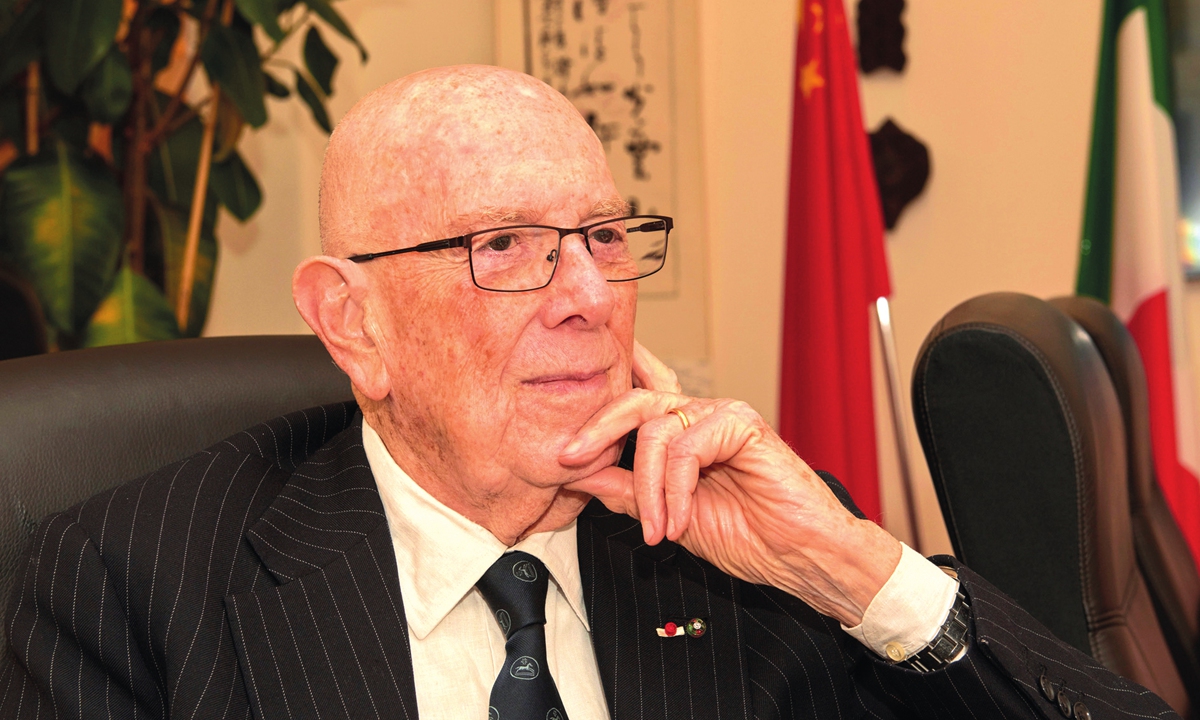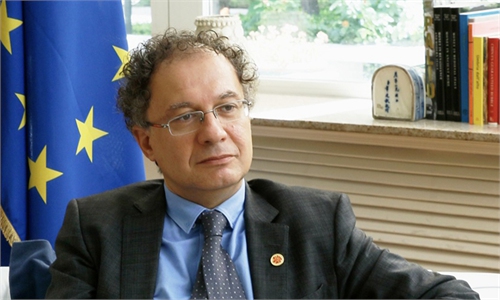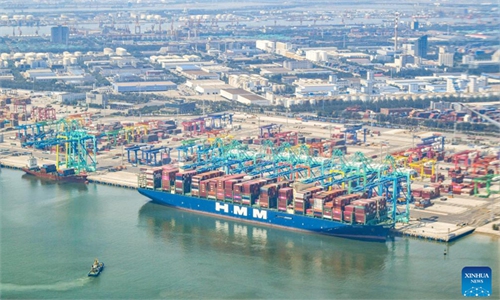GT Exclusive: Italy should be the gateway for China to Europe: president of the Italy China Council Foundation

An exhibitor displays wine produced in Italy at the sixth China International Import Expo held in Shanghai on November 7, 2023. Photo: cnsphoto
Editor's Note:
On November 4, one day before the sixth China International Import Expo (CIIE), China's first domestically built large cruise ship, christened the "Adora Magic City," was formally delivered. The ship is seen as a symbol of China-Italy cooperation. In an exclusive interview with Global Times reporter Chu Daye (GT), Mario Boselli (Boselli), president of the Italy China Council Foundation (ICCF), said Italy should be the gateway for China to Europe.

Mario Boselli Photo: Courtesy of Guido Nicora
GT: How many Italian companies are attending this year's CIIE? What are the key messages this year?
Boselli: This year's edition will see the participation of 94 Italian companies, and there are about 30 or so that have come to Shanghai with our support, including members, board members and exhibitors. This is certainly an excellent result, considering the difficult years of the pandemic that we left behind and during which participation could only be at a distance. The reopening of connections earlier this year certainly brought many positive effects in different sectors, primarily tourism, and brought our businesses back to the fair. The numbers do not equate those of the first editions, but they are definitely very positive and a very good sign of recovery for the coming years. All of this confirms to us that this is the right time to reconnect and collaborate to revive trade, which has never been interrupted even if forced to abrupt stops and slowdowns since 2020. It is also a good time to launch new initiatives, which need face-to-face meetings and handshakes like the ones that are taking place at the CIIE.
GT: What will be the main features on display this year? Some Italian companies are participating in the CIIE for the first time, what brings them to China?
Boselli: This sixth edition is the one of recovery and this will be its main feature. As successful as the event has been with digitally connected foreign visitors, their return to China is a strong and positive signal. We are talking about a fair of products and services, which need to be touched and experienced by hand, and being able to do it again will give a big boost to the agreements and contracts that are signed during this event. There are many Italian companies that have been participating since the first edition - I am thinking for example of the delegation of the Region of Puglia - and others that have returned after having already participated. For those that are at their first experience, we are talking not only about small and medium-sized companies but also about large realities: for those that are already working with China, it is an opportunity to widen the spread of their products and get in touch with new partners. For those companies that are in the early stages, it is a great way to take a first step and have a chance to introduce themselves to the Chinese market that would not be possible in other ways.
GT: China's first domestically built cruise ship also used some imported components from Italy. It is one of this year's exemplary cases demonstrating the great potential of bilateral trade. In your opinion, what will be the growth points for China-Italy trade in 2024?
Boselli: The whole of the first part of 2023 has seen a recovery in chiaroscuro, with numbers that have not reflected those of the forecasts, especially if we look at consumption and import-export. But China is and remains an immense potential market that can offer ample growth opportunities for "Made in Italy", which has always been synonymous with excellence for Chinese consumers and their high spending power. Textiles and clothing, food and beverages, machinery, footwear and leather products, furniture and furnishings continue to be among the main Italian products exported to China. But Chinese demand for Italian products has evolved and opens new areas of opportunity in numerous other sectors, in addition to the already established presence of major Italian fashion and luxury brands. We are talking about sectors such as environmental protection and energy transition, mechanics, robotics and mechatronics, services and healthcare products, as well as construction and new materials.
GT: As the global economy faces headwinds, what role the CIIE has been playing in facilitating trade?
Boselli: In its six editions, the China International Import Expo has distinguished itself as one of the world's leading platforms for promoting procurement, investment and trade between China and the rest of the world. An event that over the years has brought together hundreds of countries and helped grow Chinese imports, with the goal of reaching a total value of $22 trillion in imported goods by 2030, as indicated by Chinese authorities. The CIIE formula has proven to be very functional over the years, and to continue to ensure an effective contribution to foreign trade dynamics, it must continue to grow, keeping a constant eye on the developments and new technologies in which China is a master. On the flip side, if we look at the Italian companies that participate, they too must be alert to the changes taking place in their sectors of interest so as not to miss those opportunities that an initiative of this kind can offer.
GT: How will the Chinese fashion imports benefit business and workers in the fashion industry back in Italy?
Boselli: The reopening of China [post-pandemic] has been crucial to the resumption of flows between our countries, and imports in the industry are needed to give a boost to SMEs in our territory. The still uneven recovery of consumption in the country makes us realize that it still takes time for everything to get back to the way it was before, but we are very confident in the return of Chinese buyers to Italy, which we have seen again present in large numbers at the latest events organized in our country. Also, the Chinese tourists who, with their high spending possibilities, are slowly starting to fill squares and stores in our cities of art again, provide a good basis for a recovery of accessible luxury, which has a less widespread distribution in China than the luxury giants. We must therefore work on strengthening dialogue, further development of business cooperation on greater reciprocity and transparency in the relationship.
GT: Italy's planned withdrawal from the Belt and Road grabbed global headlines, what's your take on this matter? How will you evaluate the significance of China-Italy trade?
Boselli: There is inevitably some concern about this because we could not do without China yesterday, much less in this difficult today, and we certainly cannot do without it tomorrow. But the Italian government has handled the change in our country's role within the project well, and what we will see will only be creaks, not ruptures. In fact, our commitment as a country can easily flow into the Strategic Global Partnership and this is also why, as ICCF, we have devised a new permanent mechanism, the Italy China Economic and Cooperation Council, designed to ensure an objective and comprehensive flow of information that can provide opportunities for periodic meetings between entrepreneurs, businesses and representatives of the governments and institutions of both countries. The goal is to create a strong relationship between businesses to address specific issues, promote projects and business activities, taking advantage of the institutional support and tools, including financial ones, that China and Italy provide. We are increasingly convinced that with a view to revitalizing bilateral relations, a central role should be played by business, both Italian and Chinese, and that Italy should be the gateway for China to Europe.
GT: You have been to China many times. What has been your impression during this trip? Are you confident that China's economic growth will reach its target of around 5 percent this year? Why?
Boselli: I have traveled the length and breadth of China for the past four decades, and now that I am returning there after a 4-year forced stop, I cannot hide my excitement. Every time I have gone to this great country, I have seen it changed, and I am sure that this time it will be even more so. I am familiar with the dynamics that have led China to be the second largest economy in the world in just a few decades, and I have no doubt that it will achieve its goal again this year as it has always done, ending 2023 with a GDP for which many countries would put their signatures without a second thought. Beijing has several financial stimulus tools at its disposal that can help but will not necessarily have to be pulled out of the hat. We hope that 2024 will indeed be the year of recovery and that business and trade negotiations will resume as smoothly as possible across that bridge between Italy and China that we at ICCF try to keep as stable as possible.
GT: Some in Europe have been talking about "decoupling" or "de-risking" with China. What's your view on this rhetoric? How will they affect China-Europe cooperation?
Boselli: The current strategy reflects the evolution of the European approach regarding economic relations with China, considering Beijing's increasingly influential global position. Also considering the geopolitical events that have been shaping the development of international relations in recent years, Europe is now taking a pragmatic view, placing greater emphasis on diversification and resilience within economic interdependencies, especially in strategic sectors such as rare earths, solar energy and electric mobility.
The European Commission, which in 2019 considered a balance between collaboration, competition, and systemic rivalry with China to be sustainable, now recognizes the importance of a greater balance between these dynamics. The perception of China has changed significantly over time: once seen as a remote and unfamiliar entity, then as a competitive challenge, and later as a coveted destination for international entrepreneurs and investment. Nowadays, despite growing concerns, China remains an indispensable player on the world stage.
In the face of recent calls for reduced economic dependence ("decoupling") and greater risk mitigation ("de-risking"), it is critical to recognize the interconnectedness of our economies and the impracticality of complete separation. It is my belief that there will be a continuing search for a sustainable balance that allows the EU to pursue its strategic interests while maintaining a constructive relationship with China.



